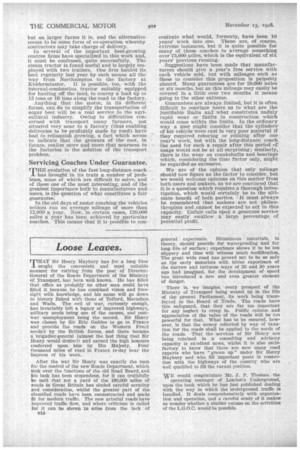L.. Loose Leaves.
Page 2

If you've noticed an error in this article please click here to report it so we can fix it.
MIIAT Sir Henry Maybury has for a long time
sought the convenient and most suitable moment for retiring from the post of DirectorGeneral of the Roads Department of the Ministry of Transport, has been well -known. He has filled that office as probably no other man could have filled it because he has combined vision and foresight with knowledge, and his name will go down to history linked with those a Telford, Macadam and Wade. The evil of war, curiously enough, has invariably left a legacy of improved highways, military needs being one of the causes, and postwar unemployment being the second. Sir Henry was chosen by Sir Eric Geddes to go to France and provide the roads on the Western Fro.it needed by the British forces, and there became a brigadier-general (almost the last thing that Sir Henry would desire!) and earned the high honours conferred upon him by His Majesty. Four thousand miles of road in France to-day bear the Impress of his work.
After the war Sir Henry was exactly the man for the control of the new Roads Department, which took over the functions of the old Road Board, and his task has been stupendous, for it can truthfully be said that not a yard of the 180,000 miles of roads in Great Britain has eluded careful scrutiny and consideration, whilst the greater part of the classified roads have been reconstructed and made fit for modern traffic. The new arterial roads have improved traffic flow, and where criticism is called for it can be shown to arise from the lack of B18
general experienee. Bituminous materials, in theory, should provide for waterproofing and for long life of surface ; experience shows it to be too slippery and time will witness much modification. The great wide road has proved not to be so safe as the early motorists with bitter experience of the narrow and tortuous ways a 20 and 30 years ago had imagined, for the development of speed has introduced a new and even greater element of danger.
There is, we. imagine, every prospect of the Ministry of Transport being wound up in the life of the present Parliament, its work being transferred to the Board of Trade. The roads have this safeguard, that they are far too important for any neglect to creep in. Public opinion and appreciation of the value of the roads will be too powerful for that. What has to be ensured, however, is that the money collected by way of taxation for the roads shall be applied to the needs of the roads. That the services of Sir Henry are being retained in a consulting and advisory capacity is excellent news, whilst it is also satisfactory to know that there are now many road experts who 'have "grown up" under Sir Henry Maybury and who fill important posts in connection with the highways of the country who are well qualified to fill the vacant position.
WE would congratulate -Mr. J. P. Thomas. the
operating manager of London's Underground, upon the book which he has just published dealing with the way in which the underground traffic is handled. It deals comprehensively with organization and operation, and a careful study of it makes us wonder whether a similar volume on the activities of the L.G.O.C. would be possible.










































